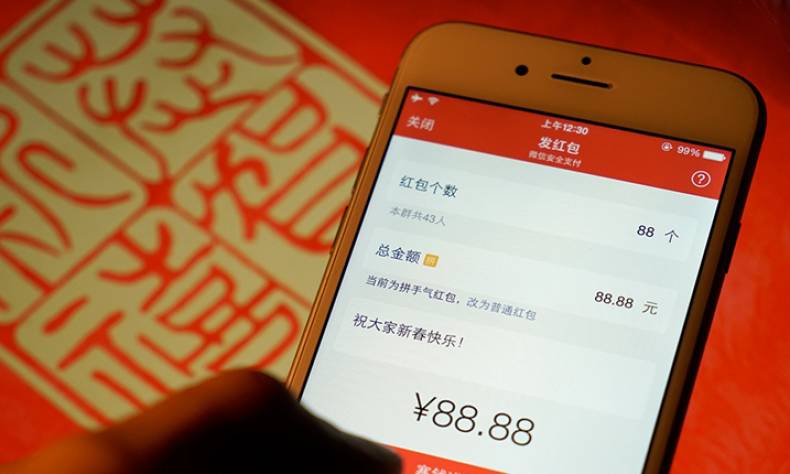
It’s Not Money but Smartphones Hurting Spring Festival
In the Year of the Monkey, the man with the most hongbao is king! Or so the saying goes. Although maybe it is Ma Huateng (also known as Pony Ma), head of Chinese internet company Tencent, that is truly king when it comes to hongbao – red envelopes filled with ‘lucky money” that are traditionally given over Spring Festival. Because while the Alibaba Group teamed up with state broadcaster CCTV to try and promote its own hongbao system through AliPay Wallet (Baidu also got involved in the hongbao-themed race for e-payment market share), it was WeChat who dominated.
Tencent said after the holiday that 516 million WeChat users (of a possible 620 mobile internet users in China) exchanged 32.1 billion virtual red envelopes between Feb. 7 and 12, an almost ten-fold increase from the year before. Alibaba and Baidu have yet to release their numbers for the same full-holiday period.
Yet a criticism that seems to be doing the rounds on Chinese social media is one that asks if the holiday has become overly commercialized or if the country has become obsessed with money during the holiday.
Well, the first was bound to happen. All holidays end up being commercialized, if they weren’t created for that specific purpose already. The recently-celebrated Valentine’s Day was historically a religious holiday celebrated to remember the Christian martyr St. Valentine who was executed for helping persecuted Christians. And look what it has become today: a parade of commercialized romance (which is actually closer to guilt) made of overpriced flowers and diabetes.
The two most celebrated U.S. holidays are Christmas and Thanksgiving; one involves buying gifts (and then judging the givers by the quality of the present) and the other is followed by Black Friday. Over time, most holidays will be “corrupted” by commerce and materialism despite the celebrations’ purest of roots.
Whether or not China has become obsessed by money is a question of culture and timing. A 2013 survey from the French global market research firm Ipsos found China to be the world’s most materialistic country, followed by India at number 2. The survey questioned 16,000 people across 20 countries and found that 71 percent of Chinese respondents agreed with the statement “I measure my success by the things I own” (compared to 34 percent for global average); 68 percent of Chinese respondents also agreed with the statement “I feel under a lot of pressure to be successful and make money” (compared to the global average of 46 percent).
But this also may come down to a question of timing. For both statements, the countries listed that agreed in higher numbers were all newly-developed (South Korea) or fast-developing (India, Turkey, Brazil, South Africa, Russia) at the time. It makes sense seeing as these countries are now rich enough for citizens to have experienced a taste of increased wealth but not wealthy enough to have the luxury of picking lifestyle over the rat race for a better quality life. One can imagine that the U.S. of the 1980s—an era of neoliberalism and yuppies—might’ve yielded different results than the U.S. of today.
A more likely reason for the fascination with smartphones and virtual red envelopes over the holiday is the increasing digitalization of the world, but especially of China. In established societies like in the Western world, there is more a feeling of tradition. People like their daily newspaper (although that is a fast fading habit), they like to shop at bricks-and-mortar stores, and they still use check books (19 percent of the value of total purchases in 2014).
From QR codes to mobile payments, China has established itself as a country of tech early adopters with a hunger for the latest in innovation. But this has its dangers. The scene of a couple on a date and not talking to each other but instead each on their phone is common enough globally but it seems ultra-widespread in China. Smartphone and app addiction is a real problem in China today and has even been blamed for rising divorce rates.
Yes, Spring Festival has become more commercialized, and yes, right now Chinese people are very concerned with money as a yardstick for success; one of these will only get worse, and the other should change with time. But it is the head-down screen-obsessed age of decreasing human interaction that is the real concern for this formerly family-oriented festival.
 Facebook
Facebook
 Twitter
Twitter
 Linkedin
Linkedin
 Google +
Google +










